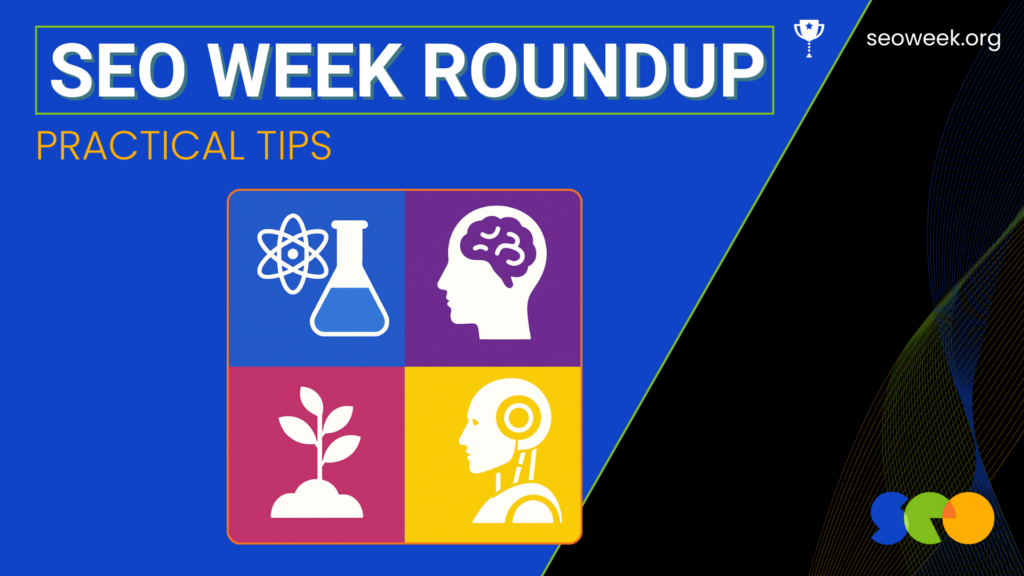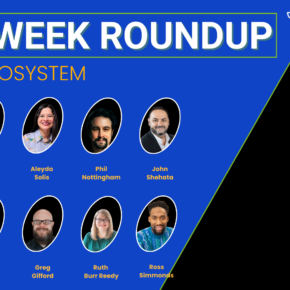One more week + one weekend before SEO Week kicks off in New York City. We’re looking at four days of the top minds in search speaking on how SEO, search, AI, content, and more are changing and how we can be best equipped to optimize for these changes.
Garrett has been doing mini-podcasts with some of our speakers, and one of the questions he’s asking is, “What is one practical tip you can give our listeners that they could go out there and implement today?” We’ve gathered together all their answers here in this post for easy access. Take it from these experts – SEO is not dead, it’s just changing. And we can make the changes we need to stay on the cutting edge.

Practical Tip:
Examine your content and identify where you can provide unique, differentiated value—something that only you or your company can offer. This could be expert insights, proprietary data, or a distinct point of view. Integrate it prominently into your content to stand out and protect yourself from competitors in an AI-driven search landscape.
Practical Tip:
If you’re using a search-enabled LLM (like Gemini, ChatGPT, or Perplexity), provide feedback on inaccurate responses. Platforms actively request and adjust based on user feedback, so flagging errors with a thumbs-down and correction can improve accuracy over time. Anyone can do this without special tools.
Practical Tip:
Check the filter pills at the top of Google’s search results to understand how Google interprets search intent and user journeys. These filters reveal Google’s assumptions about related topics and can help SEOs align their content with Google’s structure and connection of information.
Practical Tip:
Clear the decks and start with a blank slate. Forget traditional marketing frameworks and first identify your audience, what they need, and where the gaps are. Audit online communities, conversations, and behaviors (e.g., subreddits, and niche forums) to uncover unmet needs, then create solutions tailored to them.
Practical Tip:
Fall down a rabbit hole learning about input metrics. Radically reframe from reporting on things that have happened, which is like page views and rankings and clicks and traffic, and shifting to reporting on things that are changing behavior.
Practical Tip:
Start indexing specific product pages through Google’s product packs and the product knowledge panel better, differentiating them. The characteristics should be clearly showcased, of course, in the metadata and the descriptions and the review should be specific for each Q&A and the images, of course, to avoid content duplication issues and cannibalization issues.
Practical Tip:
Understanding audience affinity. When you look at the whole ecosystem, it’s a big number. Where is the overlap? Who else has mindshare or click share for those same topics? Use that as a leading indicator to identify where we want to go.
Practical Tip:
Start thinking about intent, about uncovering that biggest pain, the one reason that led people to land on your website or your landing page or a blog post. What was that pivotal moment that made them search for a solution like yours and tie it to that pain? Ask yourself, “Am I actually solving problems for people, or am I just selling?”
Practical Tip:
Stop being afraid to have your own subreddit. You need to take, even if you’re not trying to be active today, create your own subreddit before someone creates one for you. That’s free advice. And you don’t need to brand it or anything. You’re doing this for safety. You need to control your brand story.
Practical Tip:
Do digital PR, generate buzz around your brand…get to training data…use training data sets that are free and open source, you always find value in that. Any future innovations like [DeepSeek], you could get jackpot and end up in the training of that model and be the foundational element of it.
Practical Tip:
Many companies will have dropdowns in their top nav where it’s their use cases or solutions for that software, generally, or product. And then they’ll have the verticals they service. And we’re suggesting generally that you would have a mix of high-quality content that supports each of those connections.
Practical Tip:
Audit your robots.txt because a lot of folks are blocking the AI crawlers. And I think there are strong cases for doing that in some spaces, some sectors, but I don’t think there’s a case for doing it for most e-commerce and retail websites. Check that you’re letting in crawlers beyond Googlebot and the classic search crawlers.
Practical Tip:
We can go from scratch to installing Python and crawling a website within eight minutes – the full process is shown.
Practical Tip:
Do an audit [of your URLs] that is centered around conversions. See if there’s any trends you can suss out between like topics that tend to lead to more conversions and then go from there in terms of prioritizing new content and prioritizing optimizations.
Practical Tip:
Right now we’re building and we’re optimizing pages on our site to perform better in LLMs. The thing that I’m doing right now is interviewing my team members that worked on those projects and pulling out snippets of stories that when somebody who actually has to pick an agency clicks on our page at an industry level.
Practical Tip:
We know content is really important, we know structured data is really important, we know it’s going to show up in answer engines, and we still want to show up classically in Google – creating AI-citable answer blocks within your high-authority pages are the way to tackle that.
Practical Tip:
Understand your company’s goals, then take it a step further and look at the leading metrics.
Practical Tip:
Create a brand reviews page. It’s the easiest of easy low-hanging fruit there.
Practical Tip:
Double-check your tracking setup and write it down. You might think you’re tracking the right things, but it’s easy to overlook errors or gaps.
Practical Tip:
Take a very rounded view, appreciating that query intent shift is constantly happening. Dynamic re-ranking is happening. We shouldn’t expect to see the same results for a keyword constantly.
Practical Tip:
You need to track what’s going on [in] your AI visibility, which citations are being used that are ensuring your brand shows up.
Practical Tip:
Stop pitching for links. Start asking for coverage (and doing things that deserve/earn coverage).
Practical Tip:
Have as detailed of a plan as you can. Have some backups, but be really, really detailed in the initial [plan] so you have a good idea as to what marks need to be hit and when things need to escalate.
Practical Tip:
Syndication – you can get inspiration from so many different ways, not only what’s trending in your market, but you can actually take inspiration from bigger, other countries that this vertical might be like bigger or like has more content around it.
Practical Tip:
The current big conversation is about basically short and long form and how it fits together – chop a long form asset into clips.
Practical Tip:
There are a lot of enterprise businesses out there that they really care more about the GBP side of it than the website side, because that’s what it’s all about is getting found in that local area. Finding the right tools to help with that, or the right information and know the things you should be looking at will be a game changer for enterprise.
Practical Tip:
[If you] have at least five internal links pointing to random pages within the same template, your orphan page rate goes down below 1%…use concat function to save your prompts in the sheets. You don’t have to go searching elsewhere for the prompts. And you also don’t like rerun it again.
Practical Tip:
Let’s take a breather. The sky is not falling down, but search is for sure changing…looking towards the future area that’s going to be really, really important is, how do we start measuring brand visibility across these new mediums and channels?
Practical Tip:
Go and register for a quoted profile. We see quoted profiles optimizing all the time in LLMs. They don’t optimize as well on Google, but they definitely optimize in LLMs and with rich real estate. It’s free, it’s quick, it’s easy.
There are a few tickets letft for SEO Week, April 28th through May 1st in NYC! Click the link below for single day tickets or full event tickets. Discounts available for groups (based on availability).
































